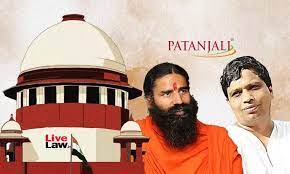During a recent Supreme Court hearing concerning the Patanjali deceptive advertisement case, the bench severely criticized R V Asokan, the president of the Indian Medical Association (IMA). The complaint centers on claims that Baba Ramdev and Acharya Balkrishna’s Patanjali Ayurved Ltd. promoted false marketing that undermined evidence-based medicine. Legal action against Patanjali has resulted from the IMA’s accusation that the corporation is engaged in a campaign against modern medicine.
The Supreme Court voiced its displeasure with Asokan’s apology during the hearing in reaction to his contentious statements against the court’s directives. Asokan had before claimed that the court’s order for allopathic physicians to confront and rectify unethical practices in contemporary medicine was discouraging to medical professionals. His remarks, which he made in an interview with the news organization PTI, prompted the court to order a public apology.
The purpose of the apology was to address and correct the criticism that Asokan had leveled at the court. The Supreme Court, however, considered the public apology to be inadequate. The apology that was published in The Hindu newspaper was too small to read, as Justice Hima Kohli and Justice Sandeep Mehta pointed out. The apology was less than 0.1 mm in size, which made it difficult to read, according to Justice Kohli, who also questioned whether there were any issues with the format.
The court stressed the importance of readability and clarity and ordered Asokan to produce hard copies of the 20 editions of The Hindu in which the apology was published. The order was given following the court’s earlier order for the apology to be posted prominently in newspapers and on the IMA website. This directive was meant to guarantee that the apology was received by a larger audience and that the court’s concerns were adequately addressed.
The court criticized Senior Advocate PS Patwalia of the IMA for not upholding its commitment sufficiently, even though Patwalia submitted a list of the publications that contained the apology. The bench stated that the court’s expectations were not met by merely apologizing online or in an unintelligible way.
In related news, the court has declared Patanjali founders Ramdev and Acharya Balkrishna not guilty of contempt after they were censured for airing deceptive commercials. Since then, they have offered their sincere apologies. The case’s purview has expanded to cover not only Patanjali’s deceptive advertisements but also the function of celebrity endorsers and more general concerns about unethical practices in contemporary medicine.
The issue keeps developing, bringing to light persistent worries about advertising regulations and the moral obligations of medical professionals on the part of both businesses and individuals.
SOURCE :
TIMES OF INDIA








